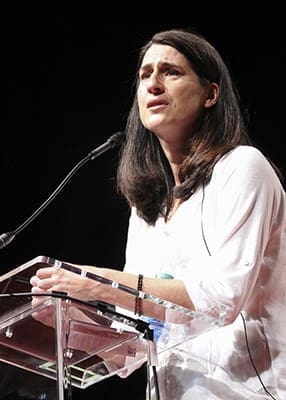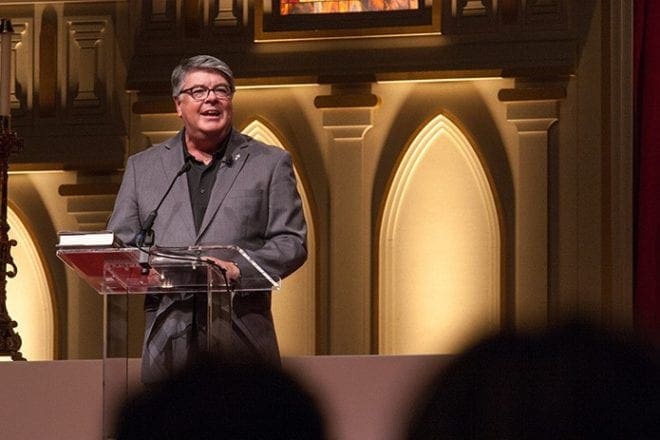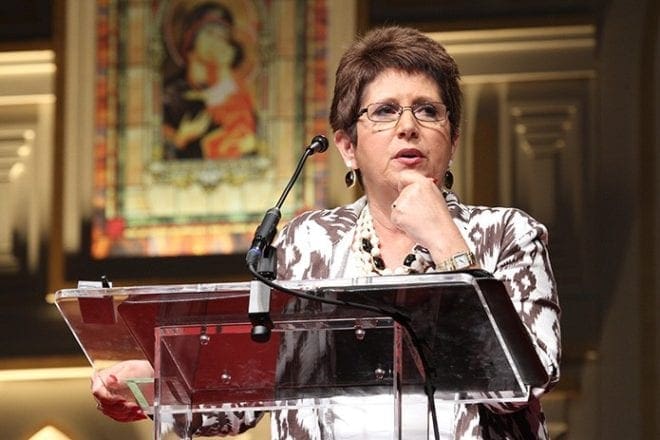 Photo by Thomas Spink
Photo by Thomas SpinkCollege Park
English track speakers, inspired by the Eucharist, say ‘trust God’
By MARY ANNE CASTRANIO and GRETCHEN KEISER, Staff Writers | Published June 12, 2015
COLLEGE PARK—With an emphasis on the Eucharist, speakers in the English track at the annual Eucharistic Congress used deeply personal stories to illuminate their messages of how to know God and know his will for one’s life.
Several thousand attendees sat in the large hall hosting the track and listened to the articulate and impassioned speakers. Longtime emcee Russ Spencer of FOX5 News kept the track moving with his own germane comments. Movement through the track was constant, as listeners came in and out of the cavernous hall, seeking inspiration and a spiritual charge.
Speakers, most of whom had been featured in past congresses over the past two decades, included Kerri Caviezel, Deacon Dennis Dorner, Teresa Tomeo and Steve Ray. Lino Rulli spoke in the track and at “Revive” the previous night.
Finding faith in family
A longtime teacher and coach and a well-known speaker on the sanctity of life, Kerri Caviezel has worked for 17 years at the Pregnancy Counseling Center in Mission Hills, California, and taught junior and high school and coached basketball previously. She has taken her pro-life message to events around the world, including appearances on “Life on the Rock” on EWTN, to discuss crisis pregnancy and adoption.
Her pro-life work, she said, “is the bedrock of what we believe.”
She said that “the simple brilliance of the Eucharist brings us together.”
She and her husband, actor Jim Caviezel, have adopted three special needs children from China, and much of her talk focused on her family.
She showed a photo on the big screen of her father, David, and her youngest son, David. Four years ago her son had come to them with a tumor on his left leg that was supposed to be benign. It wasn’t. Her then-13-month-old baby had cancer, and doctors wanted to remove his leg.

Kerri Caviezel kicks off the first of five talks in the English track of the 2015 Eucharistic Congress. Photo By Michael Alexander
Caviezel said that a priest friend told her, “If it’s the right thing (to do), you will have great clarity.”
Her father encouraged her and told her she could handle it.
Two years later, her very healthy father was told he had amyotrophic lateral sclerosis (ALS). She said, “I couldn’t think of a worse disease,” adding “God transforms us through pain.”
She said, “It all comes down to how you handle it. Jesus is with you every step of the way.”
Caviezel shared different aspects of spirituality that had helped her through these struggles: the rosary, the Mass and adoration.
The rosary “steadies my faith,” she said. It “strengthens my hope” and “deepens my love.”
Caviezel said, “God speaks to us in the silence of the beautiful monstrance.” In adoration, she finds “solitude, sacrifice, solace.”
She also spoke of her other children, beginning with her oldest, Bo, whom the couple adopted after finding out that he had a brain tumor, which turned out to be benign. She called him “the boy of unending joy” and said that he was the “perfect answer to my prayers.”
Caviezel said that she heard a voice on Jan. 24, 2005, saying, “Take care of the ones I send you.”
Bo, she said, has been “unbelievable, the gift of joy.”
They adopted LeLe, their daughter, “the girl with the courageous spirit,” also with a benign brain tumor.
Caviezel said they are both fully great now, “both wonderful.”
David, whose picture she had shown earlier, her “baby with the enduring smile,” had treatment for his cancerous tumor, with two surgeries and 13 stints in the hospital.
They bonded, she said. “I held him all the time.”
She said he’s been in remission for four years. He still has his leg.
Her dad died April 26. During the last months of his life, she said she “saw the greatest joys.” He was a gift to her children.
Caviezel said, “Know God is right there with you.”
Deacon receives joy, comfort in adoration
Deacon Dennis Dorner is the chancellor of the Archdiocese of Atlanta and the head of the diaconate program. Among other responsibilities, he leads the steering committee for the annual Eucharistic Congress in his spare time. It is, he said, “A labor of love for the past 10 years” with a 30-member committee and over 600 volunteers.
He began his talk on Saturday by stating, “I am not Father Robert Barron,” alluding to the priest who had been scheduled to speak but was felled two weeks earlier by a perforated appendix and emergency surgery. This constituted the first speaker cancellation in the history of the congress here.

Deacon Dennis Dorner, chancellor of the Archdiocese of Atlanta and head of the organizing committee for the Eucharistic Congress, talks about his holy hour of adoration and what it means to him. Photo By Thomas Spink
And then Deacon Dorner stepped into the role of speaker for the second time in 10 years.
He talked about his time at adoration, at his parish of St. Brigid in Johns Creek, where he has his holy hour every Thursday from 3-4 a.m.
“This is very precious time” to him.
Deacon Dorner talked about his profound feelings of being with God during this holy hour. He prays, “Lord I need to be with you here this morning. There’s a lot going on, and something ugly just got added.”
He prays for help.
During this adoration time, Deacon Dorner said he found it to be “amazingly intimate” and he is “refreshed” and “challenged.” He has moments of “incredible joy.”
He said, “His reality in my life is the most important thing in my life.”
He compared this time together with God to the concept of “dating.” For years, he and his wife Susan participated in marriage preparation. They encouraged the couples they were counseling to continue dating after they married.
He said, “We need to do the same with Jesus.”
So for the past 15 years, he has continued adoration, “the core of my devotion.”
Making changes with God’s help
Speaker Teresa Tomeo, who was a presenter at the 2009 Eucharistic Congress, said that at this congress she wanted to tell her own story of conversion. An author and Catholic radio show host, Tomeo often speaks and writes on women’s issues, reclaiming feminism, and helping people buffer their families and spirituality from negative impacts of the media-saturated culture.
But she said the congress theme led her to a more personal witness talk.
“The Lord wants us to open that door to our hearts. So many of us are closed. He wants to come into our lives and have a very personal relationship with us,” Tomeo said.
She related that when she was hired after college by a small radio station in the Detroit market, she stepped into work she had wanted to do since the third grade. At that age, sisters in her Catholic school handed her a microphone to turn her talkativeness to good use. By eighth grade she knew she wanted to be a broadcast journalist.
She credits her experience as a child with eventually bringing her back to the Catholic faith. “When I made my first Communion, I knew Jesus was there,” she said.
But as a young adult, thrilled with her job and a budding feminist, she left behind the faith she had in childhood. To her surprise, her future husband, Dominick, an engineer, came into her life, she “fell head over heels in love,” but although sharing her Italian-American and Catholic upbringing, they weren’t practicing the faith.
Her move into the Detroit TV market and a prime spot on the night shift with time pressures and the lure of success began to harm their marriage. “Within a few short months our marriage began to unravel,” she said.
Change came when her husband went to a Pistons basketball game with friends and was invited to be part of a men’s Bible study. His faith was ignited.
“He had this very powerful feeling we needed to get back to the Catholic Church,” Tomeo said. “I said, ‘Who is this guy, this Jesus freak?’ He came to me and said we’ve got to get back to Mass. I pushed him off.”
Then she was called in and told with no warning her television contract wouldn’t be renewed, kicked out by “the business which I idolized, which was my god for so many years.”
“I was devastated. … It’s a brutal business, but it was all I knew. It was my life. I was so angry at God, blaming God,” she said.
The pain of losing what she saw as the essence of her identity was magnified as people recognized her on the street and asked about her situation. However, during that time she and her husband also made a Marriage Encounter weekend and started working on their relationship.
After six months of unemployment, she cried out to God.
“I went to my room and said, ‘If you are the God I met on my first holy Communion, I need you.’” A week later Tomeo got a job offer from the local ABC affiliate, which she took and did for several years while trying to rebalance her life.
Then she “heard the Lord saying, ‘I can no longer use you in the secular media.’” Her 19 years of broadcast experience were shifted into Catholic radio where for the past 13 years she has had a weekday morning program called “Catholic Connection” on Ave Maria Radio, also carried on EWTN Global Catholic Radio Network and Sirius Satellite Radio. She’s written several books on spirituality and teaches online courses on the media.
“Never did I think I would be on Catholic radio, TV, talking about God. My husband is now a deacon in the Catholic Church. Never in a million years,” she said, with emphatic surprise. “The only thing I knew was news reporting and news broadcasting, but God had another plan.”
“I had to be yanked out of the environment I was in” in order for this to take place, Tomeo said.
“God never wants us to remain stagnant,” she said. “He is not only going to show you what is great with your life but where you need to improve.”

Teresa Tomeo addresses the audience during an afternoon session in the English track. Photo By Michael Alexander
“I’m still holding that microphone in my hand because those are my gifts. But God is using it for his glory, not mine.”
She quoted the prayer of her patron saint, St. Teresa of Avila, telling God, ““For you I was born. What do you want me to do?”
Tomeo asked the listeners at the congress: “Do we allow God to write the history of our lives or do we want to write it ourselves?”
“God has a special plan of vocation for every single person. Left to ourselves we strike a bargain with God. There is within our limitations, our faults, failures, there is a divine creature,” she said.
“Trust him. Love him. Give him everything. He will never, ever let you down.”
Scripture provides the answers
Catholic convert and author Steve Ray was the final speaker in the English track. He last spoke at the 2008 Eucharistic Congress. He wrote, produced and hosted the 10-part video series, “The Footprints of God: the Story of Salvation from Abraham to Augustine,” which was filmed in the Holy Land. Ray is a regular guest on TV and radio programs.
At this year’s congress, Ray concentrated on apologetics for defending the Catholic faith, particularly against those of other faiths who doubt the church’s teachings on the true presence of Jesus in the Eucharist.
He shared his personal story of his upbringing in the Baptist faith, and how he was “aghast that Catholics would worship a piece of bread … a graven image.”
He did not see the sacramentality of Communion.
Ray discussed how the Old Testament prepared for Eucharist, calling the Old Testament the “new concealed” and the New Testament the “new revealed.”
“Christianity is the fulfillment of Judaism.”
Ray gave examples, such as when the manna came down in the wilderness. The word manna, he said, means “what is it?” And it was the “bread that came down from heaven.”
Jesus is the bread, he said.
Ray talked about the Passover meal, which had a structure, an order and ritual prayers, and how Jesus changed that meal in the upper room.
When Jesus took up the bread, he said, “This is my body.” And with those words, said Ray, he changed the Passover meal into the new covenant.
Ray brought out numerous examples of the significance of the bread throughout the New Testament, recalling the words that Jesus spoke, “Unless you eat the flesh of the Son of Man, you have no life in you.”
The word “eat” in this biblical phrase translates to “gnaw or chew.” And Jesus “meant exactly what he said.”
Ray’s impassioned talk ended with his belief that the Eucharist is “food of immortality.”
“Without him, we cannot live.”
Coverage of Lino Rulli’s presentation here.